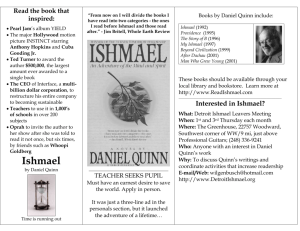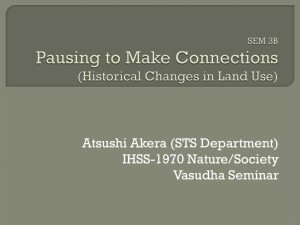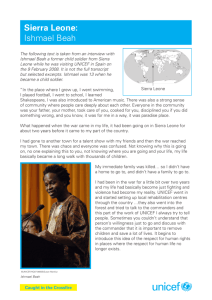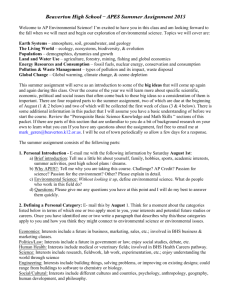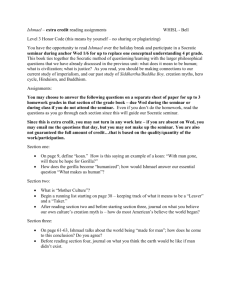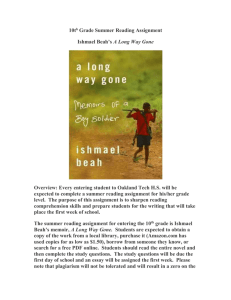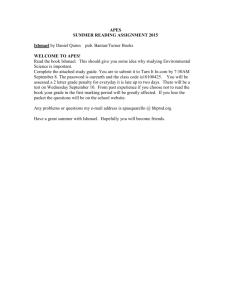A Long Way Gone Study Guide Questions
advertisement
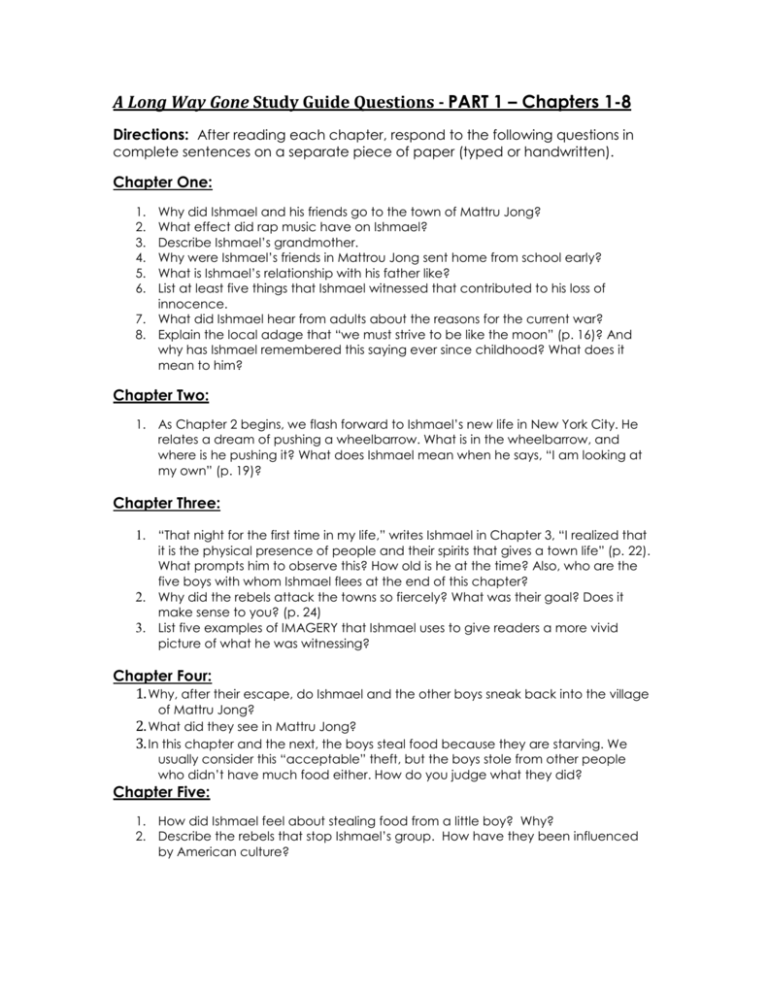
A Long Way Gone Study Guide Questions - PART 1 – Chapters 1-8 Directions: After reading each chapter, respond to the following questions in complete sentences on a separate piece of paper (typed or handwritten). Chapter One: 1. 2. 3. 4. 5. 6. Why did Ishmael and his friends go to the town of Mattru Jong? What effect did rap music have on Ishmael? Describe Ishmael’s grandmother. Why were Ishmael’s friends in Mattrou Jong sent home from school early? What is Ishmael’s relationship with his father like? List at least five things that Ishmael witnessed that contributed to his loss of innocence. 7. What did Ishmael hear from adults about the reasons for the current war? 8. Explain the local adage that “we must strive to be like the moon” (p. 16)? And why has Ishmael remembered this saying ever since childhood? What does it mean to him? Chapter Two: 1. As Chapter 2 begins, we flash forward to Ishmael’s new life in New York City. He relates a dream of pushing a wheelbarrow. What is in the wheelbarrow, and where is he pushing it? What does Ishmael mean when he says, “I am looking at my own” (p. 19)? Chapter Three: 1. “That night for the first time in my life,” writes Ishmael in Chapter 3, “I realized that it is the physical presence of people and their spirits that gives a town life” (p. 22). What prompts him to observe this? How old is he at the time? Also, who are the five boys with whom Ishmael flees at the end of this chapter? 2. Why did the rebels attack the towns so fiercely? What was their goal? Does it make sense to you? (p. 24) 3. List five examples of IMAGERY that Ishmael uses to give readers a more vivid picture of what he was witnessing? Chapter Four: 1. Why, after their escape, do Ishmael and the other boys sneak back into the village of Mattru Jong? 2. What did they see in Mattru Jong? 3. In this chapter and the next, the boys steal food because they are starving. We usually consider this “acceptable” theft, but the boys stole from other people who didn’t have much food either. How do you judge what they did? Chapter Five: 1. How did Ishmael feel about stealing food from a little boy? Why? 2. Describe the rebels that stop Ishmael’s group. How have they been influenced by American culture? 3. Commenting on how a rebel soldier had interrogated an old man, Ishmael writes: “Before the war a young man wouldn’t have dared to talk to anyone older in such a rude manner. We grew up in a culture that demanded good behavior from everyone, and especially from the young” (p. 33). Where else in A Long Way Gone did you encounter the brutal, thuggish, or even sadistic behavior of young rebels—or of other young people? 4. When the rebels overtake Beah and his brother and friends, they submit them to two selection processes. Why? What were the rebels selecting for? What did they see in Beah and his brother, Junior. Chapter Six: 1. Why did Ishmael and his friends need to stick together? 2. On page 37, Beah writes, “This was one of the consequences of the civil war. People stopped trusting each other, and every stranger became an enemy.” What does he mean by this statement? 3. How was Ishmael’s life saved in Chapter 6? 4. Describe the role that music is playing in this story so far. 5. How and why do Ishmael and his companions start farming in the village of Kamator? 6. Why is farming so difficult for Ishmael? Chapter Seven: 1. What happens to the imam in the village of Kamator? 2. What is the purpose of Ishmael’s flashback on page 45 about his father’s ceremony to bless their new home? 3. Why does Ishmael go off on his own? 4. How many days did Ishmael have no contact with humans? 5. In this chapter, Beah identifies his age as twelve years old. What were you doing when you were twelve years old? You were probably in middle school. Imagine being on your own at that point in your life. How would you feel if you were in this situation? Chapter Eight: 1. What does Ishmael tells us was the “most difficult part of being in the forest” (p.52)? 2. Beah reminisces about his family while he is alone. He looks for medicinal leaves his grandfather showed him, for the soapy leaves he discovered during a summer with his grandmother, and thinks about the story of the wild pigs his grandmother told him. He remembers that his father used to say, “If you are alive, there is hope for a better day and something good to happen. If there is nothing good left in the destiny of a person, he or she will die.” Did these thoughts help Beah or make him more lonely and depressed? What makes you think so? 3. Was Beah better off on his own or with the group of boys he found in this chapter? Explain your answer. 4. Who are the six boys Ishmael encounters after wandering and surviving in the forest on his own for more than a month? 5. Where does he know some of these boys from?

